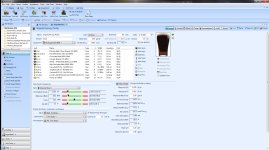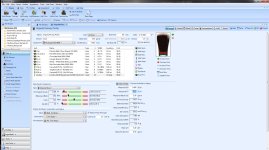DuckiesRevenge
Apprentice
So I fully do not understand why my measured efficiency numbers are WAY off of the total efficiency numbers. And everything is fine when I delete the honey from the recipe. With the original recipe, I got about 72% efficiency, ended up with 1.070 OG with 5.5gal in the fermenter. BeerSmith predicted I should get 1.073 with 75% efficiency. All's well and good. BUT... when I put in the 1.070 OG into the measured variable, it tells me I got something like 87% efficiency. Something is wrong...
So I looked at the recipe, tried changing something... I deleted the honey and altered the OG to mimic what Beersmith says I should get. After that it tells me I got 75% efficiency (which is exactly what it should be and what Beersmith told me I should have).
So, I'm guessing that Beersmith is not playing well with simple sugars and measured efficiency. Not sure if this is something others have seen or not, or if I'm just doing something wrong. I have two screen shots of the before and after of what I just described.
So I looked at the recipe, tried changing something... I deleted the honey and altered the OG to mimic what Beersmith says I should get. After that it tells me I got 75% efficiency (which is exactly what it should be and what Beersmith told me I should have).
So, I'm guessing that Beersmith is not playing well with simple sugars and measured efficiency. Not sure if this is something others have seen or not, or if I'm just doing something wrong. I have two screen shots of the before and after of what I just described.


